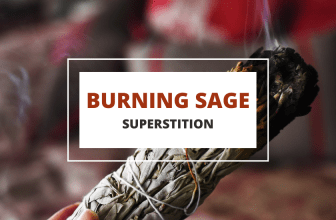
Table of Contents
It’s an automatic gesture for many people – throwing salt over the shoulder when someone accidentally spills salt. Throwing salt over the shoulder is an old superstition, passed from one generation to the next. But what does it mean? Why do people throw salt over their shoulders, particularly the left one?
What Does It Mean When You Spill Salt?
The practice of throwing salt over your shoulder is closely linked to another superstition, that of spilling salt. So, we can’t really talk about throwing salt over your shoulder without also examining the fear of spilling salt.
According to tradition, spilling salt is bad luck. Spilling salt, whether by accident or not, will bring you bad fortune and negative consequences.
These consequences can be getting into a big fight that will result in the end of a friendship. Other people believe spilling salt invites the devil to commit evil acts. And finally, if you spill salt, bad luck will follow you.
There is, however, an antidote to the bad fortune brought by spilling salt. This is where throwing salt comes in.
Bad luck can be reversed by throwing a pinch of spilled salt over your left shoulder.
The left side of the body has always been associated with negative traits. That’s why left-handedness has always been viewed as something negative, and also why we say two left feet when we talk about being bad at dancing. Because the left side is weaker and more sinister, naturally, it’s the side the devil chooses to hang around you. When you spill salt, you invite the devil, but when you toss it over your left shoulder, it goes straight to the devil’s eye. The devil will then be rendered powerless.
Origin of the Superstition

Ok, but where did this superstition originate? There are several explanations.
In ancient times, salt was a highly valuable and prized commodity, so much so that during the Roman Empire, salt was even used as currency. The very word ‘salary’ comes from the word ‘sal’, the Latin word for salt. This is why we have the expression ‘not worth his salt’ to indicate the someone isn’t worth the salt they’re paid in.
The reason salt was so highly prized was because it was so difficult to procure, thereby making it an expensive commodity. Not everyone could afford salt and therefore, even accidental spills of salt implied carelessness and wastefulness.
Religious beliefs also play a crucial role in explaining the origins of this superstition. Some religions view salt as a repellent of evil and a purifier used in their spiritual practices. Catholics, for example, believe that salt is capable of warding off negative spirits since evil spirits cannot stand it.
Even Buddhists have followed the tradition of throwing salt over their shoulder after someone’s funeral. This is done to prevent spirits from coming and entering the house.

Another theory that attempts to explain that the superstition spilling salt being bad luck comes from Leonardo da Vinci’s painting, The Last Supper. If you look closely, you’ll notice that Judas, the betrayer of Jesus, has spilled over a salt cellar. This associates spilt salt with betrayal and foreboding, as a symbol of doom that is to come.
There’s also another biblical connection that paints salt in a negative light. In the Old Testament, Lot’s wife turns back to look at Sodom, disobeying God’s instructions. As punishment, He turned her into a pillar of salt. Many believe that the story of Lot’s wife signifies that the devil is always behind you, so throwing salt over your shoulder is symbolic of chasing the devil away.
Wrapping Up
For those less knowledgeable on superstitions, salt is a versatile ingredient that is used for cooking and even beautifying and purification. For others, salt goes beyond being an ingredient as spilling it can rouse the devil. Fortunately, simply throwing a pinch of the spilled salt can also reverse the bad luck of spilling it.








